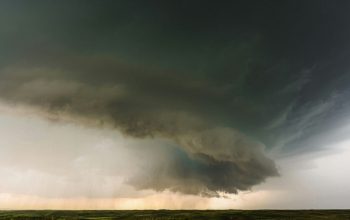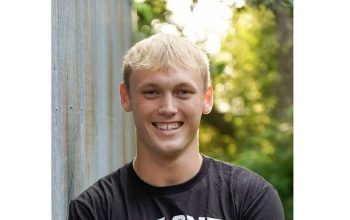Eagle Grove's official remembrance ceremonies for Memorial Day, 2022 began with a wreath laying ceremony at Eagle Grove's Veterans Memorial Park. During the ceremony, an honor guard from Post 304 of the American Legion of the Veterans of Foreign Wars fired off a full 21 gun salute, as a giant American Flag hoisted high upon the ladder of a fire truck, courtesy of the Eagle Grove Fire Department.
Afterward, the ceremonies moved out to the Rose Hill Cemetery where American flags large and small blew in the stiff breeze, in any direction one looked. Pastor Andy Pull of Grace Evangelical Free Church was among the first guest speakers. Pull spoke eloquently and from the heart, without prepared remarks, about the spirit of service, and the importance of living a selfless life – and sometimes, of dying a selfless death. "As Jesus said," Pull remarked, "there is no greater love than to lay down one's life, for one's friends." Pull noted that Jesus had laid down his own life, selflessly, for the sake of others. And, pull poignantly pointed out, so had the American military men and women whose memory we were gathered there, on hallowed ground, to honor.
Pull was followed at the podium by the event's featured speaker, Major Gavin Sandvig, a 29 year veteran, a Senior Logistics Officer in the Iowa National Guard, and an Eagle Grove native son. Major Sandvig spoke at length about the history of Memorial Day, and the importance of remembering it.
"Memorial Day is a day of national awareness and solemn reverence; a day for us to honor the military men and women who gave their lives in defense of our nation, its values and our freedom," the Major declared. "Memorial Day gives us the opportunity to stop and think about brave Americans who made the ultimate sacrifice in defense of our great nation."
Major Sandvig extolled the history of the holiday, explaining that it was originally called Decoration Day, and began after the Civil War. Its name arising from the way the families and friends of the fallen had taken to decorating their graves, leaving flags, and flowers, and mementos. As is traditional still today.
Indeed, the Major explained, there is a Regiment of the U.S. Army whose detail is to maintain and honor the graves of the fallen, at America's two most significant domestic military cemeteries.
"The Soldiers for the 3rd U.S. Infantry Regiment, "The Old Guard", place small American flags at every grave marker in Arlington National Cemetery and the Soldiers and Airmen's Home National Cemetery every Memorial Day,"
Here in Eagle Grove, that service was performed by the boys and girls of Eagle Grove Scouts BSA troops 1059G and 1059B. Who placed small flags, just as the "Old Guard'' does, at the graves of each veteran in the Rose Hill Cemetery. Among them, that of Eagle Grove's first Scoutmaster, who was also the first Scoutmaster west of the Mississippi, Howard Schoonover. Who had served in the Spanish American war.
The Major then addressed the Gold Star families of our community. "allow me to express my appreciation to you on behalf of all those present today," the Major said. "We are humbled by your sacrifice, inspired by your resilience, and grateful for your continued service to your communities."
VIETNAM, HALF A CENTURY LATER
The Vietnam War officially ended in 1975. But by 1972 the United States was already in a gradual withdrawal, and by 1973 had ended the draft, and instituted what has proven to be the greatest strength of America in the years since: the all volunteer military. As we contend with reaching the half century mark of those earlier milestones, Memorial Day is a perfect time to reflect on the conflict.
"A little over two million Americans served in uniform in Vietnam and Southeast Asia," Major Sandvig detailed, "and 58,200 were casualties. Of those who served, 115,000 were Iowans. Nearly 900 Iowans became casualties, five earned the Medal of Honor for the bravery."
Sandvig then told the story of one such Medal of Honor recipient from Iowa, Second Lieutenant Robert j. Hibbs. After joining the Army in Des Moines in 1964, Hibbs "was placed in command of a 15 man ambush patrol for the 2nd Battalion, 28th Infantry, 1st Infantry Division. Upon observing a company of Viet Cong advancing toward the 2nd Batallions's position, Hibbs and his men successfully fought off the company and began withdrawal back to the 2nd Battalion's perimeter."
"Before reaching the 2nd Battalion, Hibbs' patrol encountered the rear element of another Viet Cong company. Using the element of surprise to their advantage, Hibbs engineered a charge through the insurgent force, completely disrupting its attack."
"Near safety , Hibbs refused to return to the 2nd Battalion upon hearing that a patrol member was wounded and stuck in the area between the two opposing forces. Though injured himself, Hibbs and a Sergeant returned to recover the patrol member."
"As the Sergeant and wounded patrolman escaped to safety, Hibbs stayed behind to provide cover fire. He was ultimately killed while charging two enemy machine gun emplacements."
"Today, Hibbs is buried in Cedar Falls, Iowa, where a section of the University of Northern Iowa campus is named in his honor."
Iowans weren't just fighting on the ground in the Vietnam War, but in the skies as well. In fact airmen from Iowa were among the first to deploy to the theater. In 1968 Iowa's 174th Tactical Fighter Squadron was just the second Air National Guard unit to deploy to Vietnam. According to Sandvig, the pilots spent "countless hours over open water" flying above the Pacific ocean, "performing mid-air refueling along the way."
Keeping those planes airborne were even more Iowans, after Iowa's 185th Consolidated Aircraft Maintenance Squadron joined the 174th at Phu Cat, Vietnam. Which brought the total number of brave Iowa Airmen deployed in harm's way at Phu Cat to 375. Of those, two made the ultimate sacrifice for their country, their families, and their fellow service men and women; Lieutenant Warren Brown of Sioux City, and Sergeant Harold Berg of Rock Rapids.
Although the military wasn't as integrated across gender lines half a century ago as it is today, there were still thousands of American women who served in Vietnam, mostly as nurses. Of those, over 700 were members of the Women's Army Corps, which "first began training here in Iowa at our own Fort Des Moines during World War Two." And the Major disabused anyone who thought that these nurses didn't serve in combat zones. "Nurses were often stationed close to the front lines to provide support to Troops," the Major recounted, "which put them in constant danger, without the protective equipment that was issued to the men."
"In the military," Major Sandvig said, in his closing remarks, "we consider our greatest asset to be our people. Our all volunteer force is a credit to Americans of all races, genders, and creeds. And our common commitment to defense and love of country bids us together, and unifies us. That goes to the heart of what it means to be an American."







